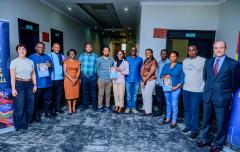Rapid cooling demand is a pressing challenge in Southeast Asia
Fast-growing global demand for refrigeration and other types of cooling is a major sustainable energy and climate change challenge, and no place more than in Southeast Asia where populations and temperatures are both rising quickly.
A new report, commissioned by the Kigali Cooling Efficiency Program (K-CEP), highlights the enormity of the cooling challenge for the Association of Southeast Asian Nations (ASEAN), and key steps governments can take to meet the demand in more energy efficient ways. ASEAN countries represents about a fifth of the global economy and include Indonesia, Vietnam, the Philippines and seven other members.
“If ASEAN countries switch to energy efficient products and lighting, they can reduce their consumption of electricity by 100 terawatt hours and at a savings of $12 billion annually,” concludes the Eco-Business report, Freezing in the tropics: Asean’s air-con conundrum, unveiled last month at the first-ever ASEAN Cooling Summit in Bangkok, Thailand. “This is equivalent to the annual production of 50 power plants (each with 500 megawatts of capacity).”
Most ASEAN countries are experiencing fast-growing economies, rising income levels and surging electricity demand. The report forecasts that the region’s electricity demand will more than double by 2040, primarily due to the growth of residential and commercial buildings. Fast-growing demand for energy-sapping air conditioners is an especially big concern, which explains the report title’s “Freezing in the tropics.”
The report warns that without new strategies and cleaner technologies, air conditioners could alone account for 40 percent of the region’s electricity demand, thus requiring dozens of new coal-fired power plants to be built – a negative outcome, in other words, for reducing climate pollution that is causing climate change.
“Providing clean, efficient cooling for all is one of the 21st century’s biggest opportunities, especially in the ASEAN region,” said Dan Hamza-Goodacre, Executive Director of K-CEP, a philanthropic program that supports implementation of the Kigali Amendment to the Montreal Protocol, which lays out targets to reduce high-polluting chemicals used in refrigerators, ACs and other cooling appliances. “Society reaps huge health and productivity benefits from cooling, but few of us realize that an air-conditioning unit is like a carbon bomb.”
The report includes several recommendations for government leaders and other decision makers, among them:
- Stronger government policies and legislation to ensure uptake of more efficient air conditioning products – the most advanced ACs available are now 30 percent more efficient than average products on the market – and better design and management practices in commercial buildings. By adopting more stringent efficiency targets for ACs, less-efficient products would be eliminated from the market.
- A wider array of incentives and financing options that would make it easier for consumers and businesses to install more efficient air conditioners systems, including tax credits, loan financing or rebates.
- Greater collaboration between businesses, governments and consumer groups to work together nationally and regionally to manage electricity demand, lower emissions and avoid reliance on coal-fired power plants.
The issues the Eco-Business report raises overlap closely with Cooling for All, an initiative launched last year by K-CEP and Sustainable Energy for All. The initiative aims to identify the challenges and opportunities of providing access to affordable, sustainable cooling solutions, especially in vulnerable countries, such as ASEAN’s Myanmar and Cambodia, with significant energy access gaps and high exposure to rising temperatures. Access to cooling services, such as refrigeration, is also critical for protecting perishable food supplies and life-saving vaccines.
More updates on the cooling challenge and upcoming work from the Cooling for All initiative will be discussed at this year’s Sustainable Energy for All Annual Forum, May 2-3 in Lisbon, Portugal. To find out more and register to attend, visit the Forum website.
Photo: Choo Yut Shing




